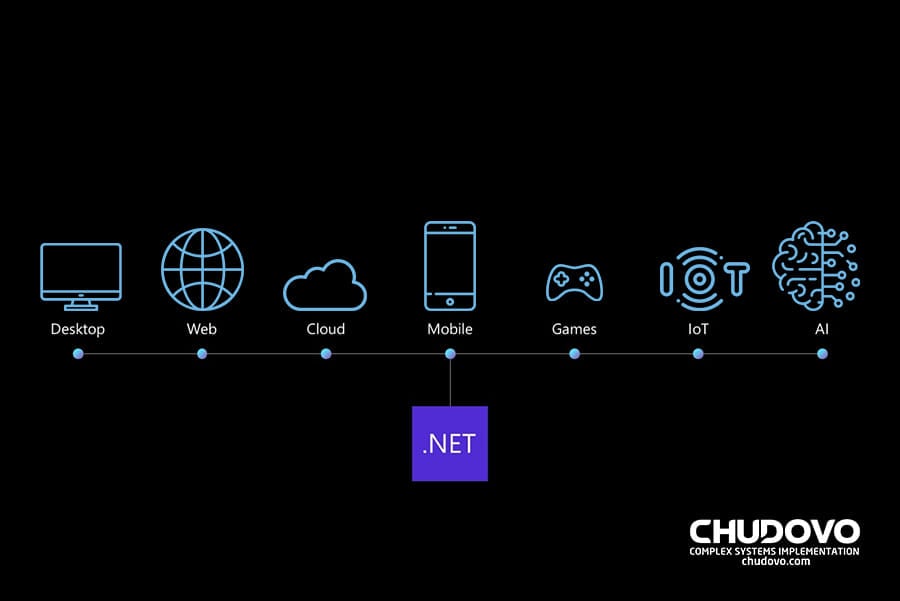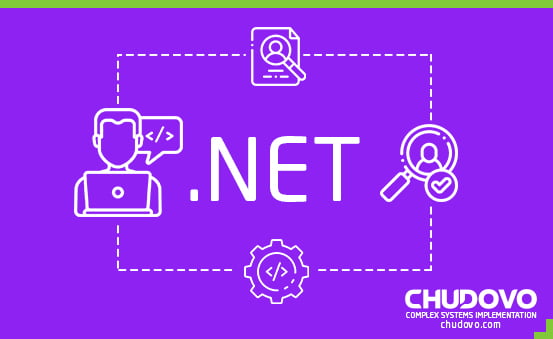Why Use .NET Platform: 5 Main Advantages for Your Product Development
Choosing the .NET platform for your product development can be a wise decision for a successful venture. .NET technology offers many advantages over other frameworks and provides powerful tools for software development and data services. With dedicated teams of .NET developers and high-load web applications, this platform stands out for efficient, high-performance software development.
In this article, we will discuss the 5 main advantages of using the .NET platform for product development; from open-source technologies and cross-platform development to leveraging the pros of .NET Core and the .NET Framework for scalable applications. We also explore the disadvantages of .NET platforms and some best practices for working with this framework.
Table of content
- What is .NET?
- Programming languages
- Implementations & Tools
- Why use .NET
- Key Advantages of Using .NET for Software Development
- Key Disadvantages of .NET Platforms
- Technologies Stack for Your .NET Project (What can you build using .NET?)
- Leveraging the Pros of .NET Platform on your project
- Best Practices for Working with .NET Platform
- Conclusion

What is .NET?
.NET is an open-source, cross-platform, object-oriented language and development platform released by Microsoft. It is used for developing a variety of software, from web applications to enterprise software and big data services. .NET supports a wide range of programming languages, including C#, VB.NET, F#, and C++. It features a friendly development environment and an extensive library of plugins, add-ons, and resources.
Programming Languages
With .NET, developers have the flexibility to choose from a wide range of programming languages and technologies to develop rich applications. From the reliable C# and F# to the modern Rust and Typescript, developers can choose the language that best suits their project needs. The platform also includes a variety of development patterns and a graphical interface designer.
Implementations & Tools
The .NET framework contains several implementations and tools aimed at simplifying and accelerating the software/product development process:
- ASP.NET Core: An open-source web application framework developed by Microsoft for creating web applications and services with C# and .NET support. It provides features such as model binding, web API services, logging, and routing.
- Windows Communication Foundation (WCF): WCF is a service-oriented, enterprise application communication framework used to connect modern distributed systems. It enables developers to build reliable, secure, and scalable services.
- Windows Presentation Foundation (WPF): WPF is a graphical tool used to create graphical user interfaces (GUIs). It enables developers to quickly create desktop and web applications with graphical elements like buttons, lists, charts, etc.
- Windows Workflow Foundation (WF): WF is a set of technologies used to implement workflows into a .NET application. It enables developers to easily add collaboration, tracking, and structured processes to their applications.
- Entity Framework: EF is an object-relational mapping (ORM) system that simplifies the development and maintenance of data-driven applications. It helps developers avoid duplicate and tedious code-writing tasks when building and maintaining databases.
Why Use .NET?
The .NET framework allows developers to build applications quickly and efficiently using the latest programming languages and development tools. The framework also makes it easy to deploy and scale applications across multiple devices and devices, enabling developers to develop and deploy applications in multiple computing environments. Additionally, .NET provides a secure and reliable programming environment with support for security models and authentication.
The .NET platform also provides extensive libraries and tools, such as the Entity Framework for object-relational mapping, the Windows Workflow Foundation for workflow support, and ASP.NET Core for developing web applications. In addition, .NET simplifies testing and debugging by offering features such as interactive development environments, automatic memory management, and refactoring.
.NET also has a number of uses when it comes to product development. With the .NET platform, developers can develop applications quickly and efficiently, and the .NET platform is designed to be compatible with many different platforms. It also supports a large number of programming languages, making it easier to switch between them.
Finally, the .NET platform provides a scalable and extensible application development environment that makes it easier to develop applications that can handle high-load web requests or handle big data requests.
Key Advantages of Using .NET for Software Development
1. Open Source
The .NET Core framework is an open-source platform, which means developers are able to access source code and make changes to tailor a product as needed. This also allows developers to easily access various libraries and other forms of support that are available to the open-source community. It eliminates the need to create and manage infrastructure, making development and deployment faster and more cost-effective.
2. Cross-Platform Development
Developers can use the same codebase they used to build applications on Windows to build applications on macOS and Linux. This allows developers to develop applications that are compatible with multiple operating systems, making it easier to create solutions that can be easily used across multiple platforms.
3. High Performance
The .NET platform offers powerful scalability and performance capabilities that facilitate the development of high-load web and big data applications, as well as other enterprise solutions. It provides an array of features that allow it to be used for building and optimizing web, mobile, and desktop applications.
4. Support from Microsoft
Microsoft provides robust support to .NET developers and a dedicated team to help with any technical requirements or difficulties. Microsoft also continuously updates the platform with new features, allowing developers to stay up to date with the latest developments and leverage the latest technologies.
5. Security
The platform includes various security features and provides a secure environment for development and deployment. These features incorporate the latest encryption algorithms, making it one of the safest choices for developing modern applications.
6. Flexible Development
The .NET framework offers multiple development methods and approaches, including ASP.NET Core, MVC, and Windows Forms, making it easier for developers to create applications using whatever approach best suits their needs. It is also compatible with a wide range of programming languages, so developers can find one that best suits their requirements.
7. Extensibility
The .NET framework is highly extensible, meaning developers can add new features to existing components or enhance existing applications with new capabilities. This extensibility makes the platform ideal for building complex, enterprise-grade applications that can be easily adapted to changing needs.
8. Product Development
The .NET platform is ideal for product development, as it allows developers to quickly build, deploy, and maintain applications. It is also cost-effective, allowing developers to work with an agile workflow, helping them to build complex products faster and more efficiently.
Key Disadvantages of .NET Platforms
1. It is Open Source but requires Microsoft licensing
Unlike some programming languages that are open source, .NET is a proprietary platform belonging to Microsoft, so developers must use licensed versions in order to access the full capabilities of the software. This means that any customization or modification to the platform can only be done by Microsoft. Although the company does provide a free version of the .NET platform, it does not provide access to all of the features of the full version.
2. It Requires a Dedicated Team
With .NET, the process of setting up an application can be quite intricate and requires a dedicated team of developers and system architects. The team may need to be larger to ensure that all aspects of the application are fully functional, and there is an ongoing need for support and maintenance as the software progresses. In addition, the development time can be significantly longer than is the case with some other platforms.
It is however worthy noting that this might not necessarily be a disadvantage if the right dedicated team is setup like the one we provide here at Chudovo.
3. It May be Limited When Dealing with High-Load Web
Web applications built using the .NET platform may not be able to handle high traffic and data load. Due to its reliance on the Windows operating system, the performance of the platform tends to be reduced when compared to other open-source alternatives. Additionally, .NET can be difficult to scale up and may not be the best solution for creating large-scale applications, such as those that deal with Big Data.
4. It May Not Be the Best for Mobile Development
Although .NET does provide support for mobile development, it is not as comprehensive as some of the other mobile development frameworks available. This means that if an application requires a significant amount of mobile-specific functionality, then it may be best to look at alternative platforms.
Technologies Stack for Your .NET Project
Here are just some of the technologies that can be used to develop a .NET project:
1. ASP.NET Core
ASP.NET Core is an open-source web framework developed by Microsoft. It can be used to develop web applications and microservices. This technology is compatible with both Windows and cross-platform .NET Core runtime. Additionally, ASP.NET Core apps can be deployed and hosted on Linux, Windows, macOS, and Azure.
2. High-Load Web Applications
For businesses looking to develop high-performance and reliable web applications, there are several technologies available on the .NET platform. Web API and ASP.NET are two of the more popular options. ASP.NET is best suited for enterprise web applications while Web API is used to create REST-based services.
3. Big Data Services
Big data services are a component of the .NET platform that helps businesses build valuable digital solutions. It provides powerful tools for data analysis and machine learning, allowing developers to develop innovative products for businesses. It also includes services for distributed computing, stream processing, and search.
4. Cross-Platform Development
Cross-platform development is a feature of the .NET platform that allows businesses to develop applications for multiple platforms. It provides a unified development experience across multiple OSs and devices, making product development more cost-efficient and time-saving.
5. Enterprise Applications
The .NET platform provides powerful tools and features to develop reliable and robust enterprise applications. It offers features such as scalability and robust security. Additionally, its well-defined development models, such as Model-View-Controller (MVC), make enterprise development streamlined and efficient.
6. Mobile Development
The .NET platform also provides tools and features specifically tailored to mobile application development. Technologies such as Xamarin and Windows Phone make mobile development more efficient and secure. Additionally, Azure provides cloud-based back-end services that make it easier to develop, deploy, and manage mobile applications.
7. Cloud Development
.NET provides a range of technologies for building cloud-based applications, including Microsoft Azure and Amazon Web Services (AWS). These technologies offer a scalable and secure platform for building cloud-based applications, allowing organizations to reduce the costs associated with managing their own infrastructure.
8. Internet of Things (IoT) Development
Internet of Things (IoT) involves building applications that connect and manage IoT devices, such as sensors, smart devices, and industrial equipment. .NET provides a range of technologies for building IoT applications, including Microsoft Azure IoT Hub and Windows IoT. These technologies offer a scalable and secure platform for building IoT applications and provide a range of tools for connecting and managing IoT devices.
Leveraging the Pros of .NET Platform On Your Project
- Build Applications to Scale – With the .NET platform, businesses have the ability to create and maintain applications that can easily scale. It provides developers with tools to build applications that can handle high volumes of data, requests, and traffic. With its high-performance capabilities, applications can quickly and easily scale as needed.
- Leverage the Advantages of .NET Framework – With the .NET framework, businesses have access to a range of features and tools to leverage the advantages of the .NET platform. This includes tools such as a code compilation tool, a debugger, and a code analyzer that make development more efficient and secure.
- MVP Development – An MVP (Minimum Viable Product) is a testing stage that allows businesses to present their product idea and get user feedback before investing financially. This is a great way to determine the project’s potential and realize a successful product launch. The .NET platform provides features and tools specifically designed to develop a proof-of-concept MVP.
- Digital Strategy – Digital strategy is an important part of product development. When developing an application with the .NET platform, businesses are able to create a unique digital strategy that meets their project’s requirements and aligns with their business objectives.
- Microservices Development – The .NET platform provides tools and features specifically designed to develop scalable and secure microservices architecture. This helps businesses build scalable, cloud-based applications that can easily scale as needed.
- Software Product Development – .NET platform offers powerful tools and features to create, maintain, and monitor software products. With tools such as Azure, which provides benchmarking and log analysis, developers are able to build secure and reliable software products.
Best Practices for Working with .NET Platform – here’s how Chudovo can help you achieve your business goals using .NET platform
Choose an Experienced .NET Tech Team – Selecting an experienced .NET tech team is an important step in product development. With their expertise and knowledge, the dedicated team can ensure the successful launch of the product and ensure that it meets performance and scalability requirements.
Chudovo .Net development dedicated team is a group of certified and experienced developers setup to meet the specific performance and scalability requirements of any project or company.
Chudovo’s experience is varying between big enterprise solutions which require the involvement of whole teams of up to ten-twenty .NET engineers and small projects that need the assistance of several developers in general.
So if you need bespoke .Net development services ranging enterprise software development, microservices development, desktop app development, web application development, cloud software development, mobile app development, kindly CONTACT US right away to get started.

Certified engineers
Convenient rates
Fast start
Profitable conditions
Agreement with
EU company
English and German
speaking engineers
Choose the Appropriate Programming Languages – Choosing a suitable programming language is important for building powerful applications. The .NET platform provides developers with a range of programming languages, such as C#, VB.NET, and F#, so the right choice should be made to leverage the advantages of the platform. Chudovo dedicated .net development team can also help in this regard.
Choose Suitable Developer Platforms – To maximize the advantages of the .NET platform, businesses need to choose the right developer platform. This includes selecting cloud services, such as Azure and AWS, that provide the necessary features and resources to streamline development.
Conclusion
Using the .NET platform for product development provides businesses with many advantages. It is reliable, cost-effective, and offers powerful features such as scalability and robust security. Additionally, the .NET platform has open-source technologies and provides dedicated teams of .NET developers. Furthermore, businesses can leverage the pros of the .NET Core and the .NET Framework for efficient and powerful applications. Despite some of the disadvantages of the platform, such as complexity and difficulty to debug, the .NET platform remains a great choice for businesses seeking reliable and cost-effective product development solutions.





